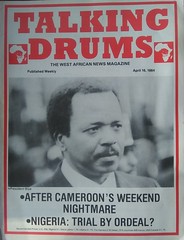Markets Around Africa
New regime liberalises Guinea's economy
by Ben Mensah
As pointed out by the Financial Times of London, reconstruction of the country's neglected and run-down economy is a top priority for the new military government led by Col Lansana Conté, former commander of the Boke region near the border with Guinea-Bissau.
The programme specifically mentioned development of private enterprise and the rapid and substantial participation of private investment, both foreign and local.
This will however be seen by observers of the Guinean scene as a continuation of the economic policy of the late President Sekou Toure whose about turn took him to the US to woo private capitalist finance for his projects.
This is not surprising because despite the military regime's condemnation of the domestic policies of the late President they have been forthcoming in their commendation of his inter national image.
It is noted that since a policy of free enterprise thrives only in free society, President Sekou Toure's economic programme under a National Development plan could not take off due to his autocratic style of government and repression of human rights. Otherwise the open encouragement to private investment whether foreign or local in small and medium sized enterprises with such range enticements as import duty relief for raw materials, machines and spare parts, tax relief, guaranteed rights for foreign investors to transfer profits and investments and assurances against nationalisations should have yielded the required fruits.
In pursuit of this programme, the Director of the office of studies at the Ministry of Small and Medium Enterprises, Mr Abdowaye Diallo was attached to the Centre for Industrial Development in Brussels to promote five projects on behalf of local entrepreneurs.
For all the five projects, he sought mainly technical partners, pledging that local partners would be able to meet all local costs. He also pledged that his ministry would provide foreign exchange for equipment.
The National Development Plan was meant to encourage the production of goods in constant demand such as soap, building materials, processed or preserved food and the projects Mr Diallo was promoting were:
Sawmills and furniture workshops.
Factory to make cement-based tiles. Project to modernise an existing soap
- works.
Guinea's main assets are minerals, EEC. principally bauxite, iron ore, diamonds and gold and its agricultural resources are cattle, goats and poultry.
Yet since independence from France in 1958 its economy has steadily disintegrated and per capita GNP of $300 per year puts her among the world's poorest countries.
Collective farms and state industries have proved a disaster and its seriously overvalued and unconvertible currency the Syli - has encouraged massive black marketeering and smuggling.
A policy of economic liberalisation by the new military rulers, buttressed by the restoration of democratic rights, should bring the urgently needed relief to the economic lives of all Guineans. But the new rulers may be driving too fast with their economic measures by proposing to privatise the banking sector of the economy. *** Nigeria aims at early recovery Nigeria's Head of State, Major- General Muhammadu Buhari, says that an early recovery of the nations's economy and the revival of agriculture are top most in his administration's national programme.
The government, he added, is also embarking on rural development programmes to improve the quality of life of the rural population with a view to stemming migration to urban centres.
The Head of State was exchanging views with the commissioner for development with the European Economic Community, Mr. Edgar Pisani, who paid him a visit in Lagos.
General Buhari said he was delighted to know that the EEC was willing to participate in the commercial and development programmes of third world countries. He announced that Nigeria will send a special government delegation to Brussels this year to explore increased trade relations with the EEC.
At another meeting in Lagos the EEC was told that to successfully imp Establishment of a chicken breeding lement her agricultural programmes, Nigeria will need the assistance of the unit.
The permanent secretary in the Federal Ministry of Agriculture, Water Resources and Rural Development, Mr. Popoola, said such assistance will cover areas of production, human resources development and storage facilities for the products.
Mr. Popoola is confident that the nation would attain self-sufficiency in food production in two years. STABEX funds for Ghana The European Economic Community (EEC) is to provide ECU 31,160,673, or approximately US$26.5 million to Ghana to compensate for the fall in the country's earnings from the export of cocoa beans and cocoa products to the Community in 1982.
These funds are provided under the Stabilisation of Export Earning (STABEX) system contained in the Second Lome Convention. The STABEX system aims to remedy the harmful effects of the instability of export earnings on economic growth in the ACP states.
According to a statement issued by the Delegation of the Commission of the European Communities (EEC) in Ghana in Accra, the funds still remain ing under STABEX for 1982 were in sufficient to meet the full amount of Ghana's request, but under the terms of Article 34 of the Second Lome Convention, up to 20 percent of the following year's instalment may be used in advance.
